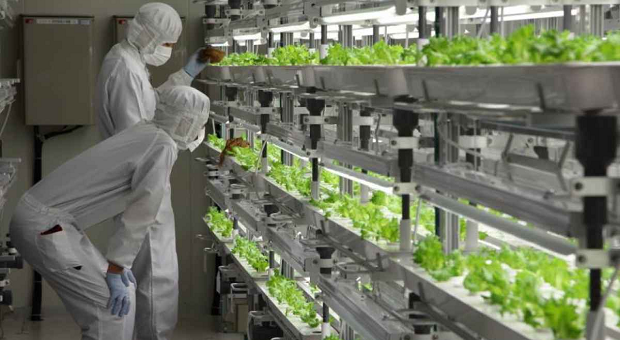Robotic Lettuce Factory Under Development In Japan

August 5, 2015 – A fully automated lettuce-producing factory has begun construction in Japan, food company Spread said today.
Spread already operates the world’s largest vegetable factory using entirely artificial lighting, which is located in Kameoka, Japan. Now, they’re working on a fully robotic factory capable of producing 30,000 heads of lettuce per day, with construction expected to begin in spring 2016 and lettuce grown in the new facility expected to ship in summer of 2017.
Their long-term goal is to produce 500,000 heads of lettuce per day in five years.
Spread Co., founded in 2006, produces “Vege-tus” brand lettuce. The new factory is designed to be responsive to water and food shortages caused by extreme weather and the increasing global population. Its environmentally friendly measures include recycled water, LED lighting and optimized air conducting.
Full automation, from seeding the lettuce to harvesting the heads – will cut down on the cost of production, Spread said. Complete automation reduces labor cost by 50 percent. The initial investment cost per head of lettuce was reduced by 25 percent compared to the investment cost per head at the Kameoka factory. Spread is looking beyond Japan, too: the new factory setup is designed so that the stable cultivation environment could be created in any location around the world.
The factory will be a vertical farm spread out over 4,800 square meters of enclosed space, which also includes R&D and testing facilities. It cost about 1.6 to 2 billion yen ($12 million to $16 million) to build, with annual sales estimated at 1 billion yen.
Spread plans to use this factory as a headquarters as it expands its franchise business. The company has established a consortium along with four other cultivation and factory development companies – OBAYASHI, Tsuhakimoto Chain Company, Toray Industries, and WIT Corporation – in order to promote technological development around the world. OBAYASHI contributes its know-how of construction engineering and environmental control technology, while Tsubakimoto Chain Company brings automated equipment related to cultivation. Toray Industries specializes in treatment and recycling for water in industries related to cultivation. WIT Corporation will contribute to the development of the factory’s total management system, which forecasts demand, sales, logistics, quality, and cultivation statistics.
“We have taken advantage of the accumulated know-how and have been considering the construction of a new factory in an effort to further create high quality products that can provide a peace of mind in a stable manner,” Spread said in a press release.

